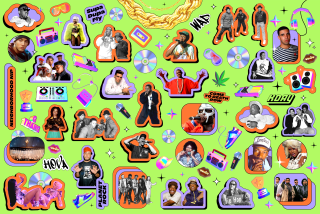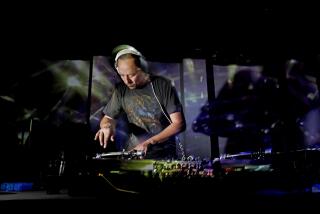POP MUSIC REVIEWS : Radiators Hot but Fail to Boil Over
- Share via
The hallmarks of a good bar band are consistency, stamina and professionalism, the ability to churn out catchy and rhythmic music that will keep the folks shaking it on the dance floor and swigging it at the tap.
With most bar bands, the stakes do not get much higher than that. Bar band music is functional, not inspiring. It may move the body, but it normally does not transport the spirit or stir the mind.
Wednesday night at the Coach House in San Juan Capistrano, the Radiators gave fans 2 hours of solid bar band music--nothing to sneeze at, but nothing that made it a night to remember, either.
What supposedly makes this veteran New Orleans band special is its way with the distinctively funky, rolling R&B; rhythms of its hometown’s musical tradition. In their earlier years, the Radiators used to back up the likes of Professor Longhair and Earl King, musicians who put their unique stamp on the New Orleans stomp. But ‘Fess is dead and gone to blue heaven, while King is probably hanging out at the local New Orleans doughnut shop, where he likes to observe the passers-by and jot down song ideas. That leaves the Radiators on their own: a good, tight bar band without any distinctive personality to give its funkiness a focus.
It is hard to avoid comparing the Radiators to the Neville Brothers, today’s definitive New Orleans R&B; band. While the Radiators produced some of the darkly surging, hard-hitting rhythms that are a Neville trademark, the spirit of their music was thin where the Nevilles’ is rich.
The Neville Brothers take New Orleans funk beyond the dance floor and turn it into a fiercely personal statement of their cultural and family heritage. The Radiators just leave it on the dance floor.
The Radiators were also limited by their lack of a distinctive singer. Ed Volker, who plays keyboards and writes most of the songs, had his drawling bluesy mannerisms down, but his voice lacked the body and range to back them up. Dave Malone did better with a throaty, earnest singing style, but his husky sound was commonplace.
Perhaps because their singers are only adequate, the Radiators focused on the double lead guitar work of Malone and Camile Baudoin. Both are capable but unexceptional. Baudoin has a supple touch and a raucous slide-guitar style, but he resorted too often to electronic effects that gave him a gurgling, artificially liquid sound. It was interesting at first, but became tiresome with repetition. Malone is a sharp rhythm guitar player but an unimaginative soloist.
While the musicianship was strong, stage presence was minimal. Volker and Malone were fully engaged in performance, but bassist Reggie Scanlan looked bored, and Baudoin looked like the most dour, reserved Cajun ever to step on a concert stage. The best bar bands put out far more enthusiasm than the Radiators showed.
There were moments when the six-man band pushed beyond proficiency, but it failed to break through to originality. “Devil’s Dream” offered guitar harmonies and percolating rhythms out of the Allman Brothers Band lexicon, “Magnolia” was a recycled Rolling Stones ballad and any number of songs were more or less homages to Little Feat.
To their credit, the Radiators did not deny their debt: They began their encore with Little Feat’s best-known song, “Willin.’ ”
Departures from honored sources produced catchy but slight mainstream pop-rock tunes such as “Like Dreamers Do” and “This Wagon’s Gonna Roll.”
The real law of the fish, judging from the Radiators’ performance, is to take a melodic hook and keep casting it out in a long series of repetitions. While that kept the focus on tunefulness, it also made it evident how skimpy the Radiators’ songwriting is.
The Delgado Brothers, a local blues-rock band, did not break the barriers of bar music, either, but seemed hungrier than the Radiators in a 50-minute opening set.
Drummer Steve Delgado sang with a strong, rich blues voice, and guitarists Jim and Joe Delgado displayed contrasting, complementary styles--Jim flashy and prolific, Joe with a cleaner, more restrained approach.
The Delgados showed versatility by playing a solid version of the New Orleans standard, “Brother John.”
More to Read
The biggest entertainment stories
Get our big stories about Hollywood, film, television, music, arts, culture and more right in your inbox as soon as they publish.
You may occasionally receive promotional content from the Los Angeles Times.











